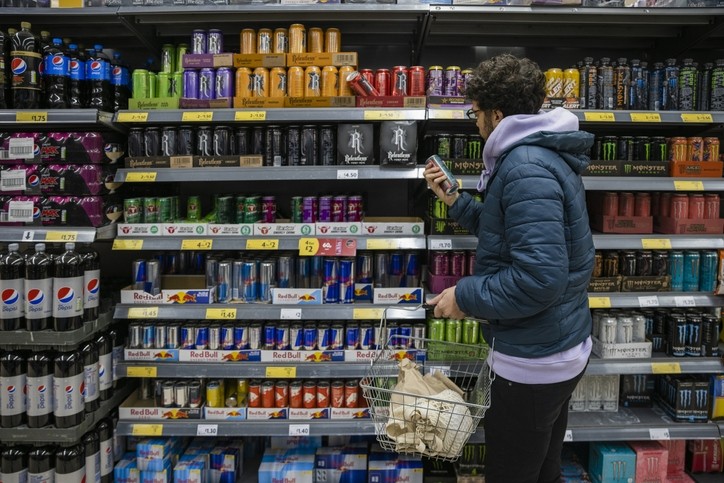Review calls for lower caffeine limits in energy drinks amidst health risk concerns

The systematic review by authors from Italy examined the health effects of energy drink abuse with a focus on cardiovascular side effects, concluding: “The daily intake of energy drinks should not only not exceed the safety limits for caffeine established by European and American regulatory authorities, but should be even lower.”
In May 2015, The European Food Safety Authority (EFSA) published a report on the safety of caffeine, concluding that single doses of caffeine up to 200mg and daily intakes of caffeine up to 400mg do not raise safety concerns. For children and adolescents, single doses of caffeine up to 3mg/kg body weight and daily intakes of caffeine up to 3mg/kg body weight do not raise safety concerns.
For a 10-year-old child weighing 30kg, this would work out to around 90mg of caffeine, which is just over one 250ml can of standard energy drink.
The review notes concern about underreporting of deaths related to energy drinks, especially among frequent users, like adolescents and athletes.
The authors add that while common individual components are safe, excessive consumption, particularly among adolescents, can harm health, especially the cardiovascular and cerebral systems.
Energy drinks, often marketed to enhance mental acuity and physical performance, reportedly prompted a 70% increase in caffeine consumption among children and adolescents between 1977 and 2009, with an average caffeine intake of 61 mg daily for teenagers.
The authors of the current review assert that this has led to a rise in emergency room visits due to various health issues, including anxiety, gastrointestinal problems, and even life-threatening conditions like rhabdomyolysis and seizures.
Industry response
Responding to the review, Daniel Lourenco, co-founder of performance energy drink brand Ghost, tells NutraIngredients: “It's my opinion that energy drinks have been unfairly vilified, frequently lumped together, and subjected to blanket judgments.”
“The fastest growing segment of energy drinks over the past few years is performance energy drinks — a subcategory that generally features zero sugar and additional functional ingredients, such as NeuroFactor and AstraGin. That’s where companies like Ghost and others participate.
“The total energy category has grown 29% from 2020-2022, and performance energy specifically grew 80% over that same time frame. Ghost stands out from the entire energy drink industry because of our full disclosure label, which lists the dose of each active ingredient (including those mentioned above) and our high standards of using them only in efficacious amounts.”
As Lourenco notes: “The distinction between traditional and performance energy drinks is critical, and to continue to paint energy drinks with such a broad brush is inaccurate and irresponsible.”
“I would personally be fully supportive of additional guidelines, regulations, or limits on caffeine content and/or consumption of energy drinks.
“I think it's wrong to demonise the category absent these guidelines.”
However, he adds that with the review’s focus on caffeine, it would be remiss not to concurrently explore the caffeine content in popular chain coffee establishments, explaining: “Coffee chains frequently feature beverages that not only surpass the caffeine content of the average energy drink but also exceed 100 grams of sugar in some instances.”
The review included an electronic search using PubMed, Google Scholar, and EBSCO to identify peer-reviewed articles published between 5 January 2009 and 30 April 2023, using the search terms ‘energy drink’, ‘Red Bull’, ‘Monster’, ‘taurine’, ‘adverse effects’, ‘arrhythmia’, ‘renal failure’, ‘death’, ‘gastrointestinal’ in the title, abstract and keywords.
Taking into account only original research articles and case reports, 96 scientific papers were included.
Key ingredients
The authors note that typically, energy drinks contain the ingredients taurine and guarana, as well as carnitine, and vitamin B complex.
Taurine’s physiological functions encompass neuromodulation, cell membrane stabilisation, and the regulation of intracellular calcium levels.
Carnitine plays a pivotal role in energy production, serving as a cofactor that facilitates the transport of long-chain fatty acids into mitochondria for oxidation, leading to adenosine triphosphate (ATP) energy generation.
Guarana (Paullinia cupana), has historically served as a stimulant. Guarana seeds surpass coffee beans in caffeine content, containing additional xanthine alkaloids such as theobromine and theophylline.
The botanical additive enhances the caffeine content and stimulatory attributes of energy drinks, however, its caffeine content can reportedly go unlisted on product labels due to its status as an herbal supplement.
Vitamin B complex includes thiamine (B1), riboflavin (B2), niacin (B3), pantothenic acid (B5), pyridoxine hydrochloride (B6), biotin (B7), inositol (B8), and cyanocobalamin (B12).
These vitamins act as coenzymes that are integral to proper cellular function, particularly in mitochondrial activity and energy production, so it is proposed that B vitamins might increase energy expenditure.
However, the authors note that these components' combined effects with caffeine are still unknown.
Health effects
One double-blind, placebo-controlled trial administering caffeine, taurine, and glucuronolactone to the experimental group, yielded shorter motor reaction times and higher emotional well-being scores.
While the study implied a positive cognitive impact, GABAergic, glycinergic, cholinergic, and adrenergic neurotransmitter system interactions were suggested, acknowledging the caffeine factor.
The European Cardiac Arrhythmia Society (ECAS) previously conducted a critical review of data on energy drinks to assess their impact on cardiovascular events.
Caffeine has been shown to have direct effects on the heart, including increased heart rate and contractility.
Energy drink consumption has also been relayed to cause arrhythmias, coronary spasms, myocardial infarction, atrial fibrillation, and even sudden cardiac death.
The authors mention there have reportedly been nine cases of cardiac arrest associated with high doses of energy drink components.
They make the recommendation that companies should adhere to the established safe caffeine limits, limiting energy drink intake to one can at a time and no more than two cans per day, and cautioning against high-caffeine products.
Journal: Nutrients
“The Dark Side of Energy Drinks: A Comprehensive Review of Their Impact on the Human Body.”
https://www.mdpi.com/2072-6643/15/18/3922
Authors: Andrea Cosantino, Aniello Maiese, Julia Lazzari, Chiara Casula, Emanuela Turillazzi, Paola Frati, and Vittorio Fineschi.





